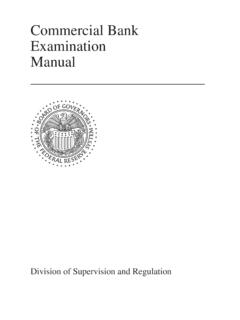Transcription of Regulatory compliance strategies for commercial lenders
1 Regulatory compliance strategies for commercial lenders Presented by: Jim Conley and Susan Roemer Regulatory compliance strategies for commercial lenders Presented by: Jim Conley and Susan Roemer Outline of Today s Presentation General and basic discussion of Laws and Regulations applicable to commercial lending. commercial lender responsibilities for compliance . Personal and organizational cost and consequences of non- compliance . Outline of Today s Presentation Laws and regulations applicable to commercial lending: Fair Lending Laws and Regulations Equal Credit Opportunity Act (ECOA) Fair Housing Act (FHA) Fair Credit Reporting Act (FCRA) Home Mortgage Disclosure Act (HMDA) Community Reinvestment Act (CRA) Flood Disaster Protection Act (FDPA) Interagency Appraisal and Evaluation Guidelines Servicemembers Civil Relief Act (SCRA) Loans to Insiders (Reg.)
2 O) Other Laws and Regulations (BSA, OFAC, USA PATRIOT ACT, ADA and many more) Fair Lending Due to the implementation of Dodd Frank, Fair Lending Laws (ECOA and FHA) are being more rigidly enforced by the CFPB, the Department of Justice and State and Federal Regulatory agencies. Examination coverage is becoming more comprehensive with more sophisticated methods and analytic techniques being utilized. Fair Lending (continued) Other relative laws that weigh in the process with enforcement actions taken to ensure the accuracy and completeness of monitoring data include: FCRA HMDA CRA Residential Real Estate dwelling secured loans remain a focal point of enforcement of Fair Lending Laws.
3 Fair Lending Prohibited Basis Discriminatory acts and practices, disparate treatment and disparate impact all revolve around prohibited basis, as defined by FHA and ECOA as follows: ECOA: Marital Status, Age, Public Assistance Income, Rights exercised under Consumer Credit Protection Acts (CCPA) ECOA and FHA: Race, Color, Religion, Sex, National Origin FHA: Familial Status including Same Sex Marriages by CFPB Policy, Handicap Fair Lending Best Practices Fair Lending is more easily said than done. Inadvertent, unintentional it doesn t matter.
4 Establish prudent policies with specific guidelines addressing fair lending considerations for application, underwriting, servicing and collection practices. Include specific documentation and approval requirements for exceptions. Standardize products. Minimize discretion. Ensure commercial Lending activities and processes are properly and diligently evaluated as part of the organization s fair lending risk assessment. FL Best Practices (continued) Take applications for all commercial loans include ECOA rights disclosure and for Ohio, the Ohio Civil Rights Disclosure Obtain notice of intent to apply for joint credit from all persons applying for credit and all guarantors Be mindful of prohibited basis applicable to various transactions and activities (by the bank, borrowers, appraisers and third Parties) including selling, renting, brokering, appraising, pricing (rates and fees), terms.
5 The discriminatory acts or practices of others may extend to the bank. Take applications or formal written requests for modification and extension agreements. Process and underwrite these with the same uniform standards and procedures as a loan application. Fair Lending EQUAL CREDIT OPPORTUNITY ACT (ECOA) Adverse Action Notices (notice of action taken) Appraisal Notices and Delivery Requirements ECOA Adverse Action Adverse Action: A refusal to grant credit in substantially the terms requested unless creditor makes a counter offer that the applicant accepts.
6 May also apply to requests to renew, extend, increase or modify credit depending on standard policies, procedures and practices. Adverse action notices: for businesses with revenue =< $1 million, may be given orally if ECOA rights are disclosed at the time of application. However, upon request, a written notice with a statement of reasons must be provided. If the ECOA rights are not given at the time of application, a written notice of adverse action must be provided. Adverse action may be given orally for businesses with >$1 million in revenue.
7 However, if an applicant requests within 60 days, a written statement of reasons must be provided. Guarantors aren t applicants and not entitled to adverse action notice. ECOA Appraisal Notice Disclosure of right to receive a copy of appraisal/valuation; required for loans secured by 1st lien on a dwelling. Creditor must also provide a copy of the appraisal or other written valuation promptly upon completion or 3 business days prior to consummation for a closed-end transaction or account opening for open-end credit whichever is earlier.
8 Deliver to primary applicant . Primary applicant may waive early delivery requirement. FCRA & FACTA FAIR CREDIT REPORTING ACT (FCRA) FAIR AND ACCURATE CREDIT TRANSACTIONS ACT (FACTA) FCRA Credit reports are consumer reports - even if pulled for business purpose credit. Only pull credit report for valid business purpose. Remains a consumer report subject to all the consumer protections. Guarantors are not applicants and not entitled to FCRA adverse action disclosure. Individual business loan applicants denied on the basis of credit report information must be given an FCRA adverse action notice.
9 Provide notice of action taken to credit applicant. Never provide the guarantors credit score to the applicant. If credit information is furnished to credit reporting agency, only report on guarantors when creditor has exhausted efforts to collect from borrowers and demanded payment from guarantors. FA C TA commercial borrowers (entities, individuals, guarantors) are subject to identity theft. Be alert to identity theft and know the red flags. Ensure the commercial Lending Department is included in the bank s identity theft (red flags) risk assessment.
10 Know your borrowers and guarantors. HMDA Reg. C HOME MORTAGE DISCLOSURE ACT (HMDA) CFPB REG. C HMDA Reg. C Gathering and reporting of certain data for loans secured by a dwelling for the purpose of purchase, refinance or home improvement. Home improvement is any loan secured or not secured by a dwelling to be used, at least in part, for repairing, rehabilitating, remodeling, or improving a dwelling or the real property on which the dwelling is located. A home improvement loan may include a loan made outside a banks residential mortgage area.


